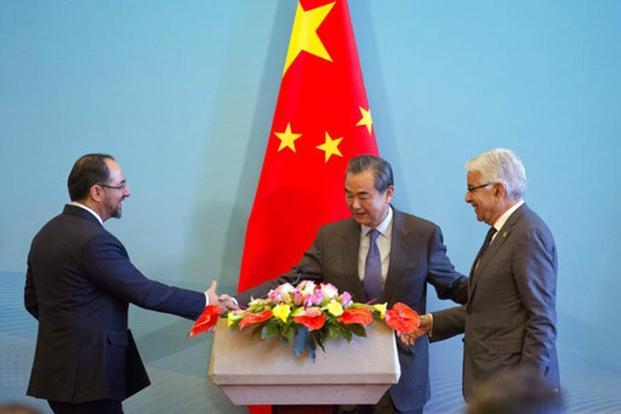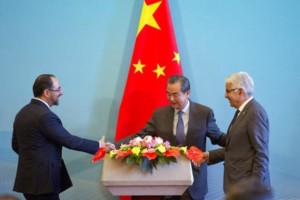

BEIJING: China and Pakistan have decided to speed up and extend the USD 50 billion China-Pakistan Economic Corridor towards Afghanistan during Foreign Minister Wang Yi’s recent visit to Islamabad, the Chinese Foreign Ministry said on Monday.
Wang, designated as China’s top diplomat as he is also the State Councilor — a higher rank in the Chinese political hierarchy — visited Pakistan from September 7 to 9 and held talks with the new government headed by cricketer-turned-politician Imran Khan. His visit was mainly aimed at exchanging views with the new government and compare notes with Pakistan on cooperation in all areas, thus making “our bilateral cooperation to get off under the new circumstances”, Chinese Foreign Ministry spokesman Geng Shuang told media briefing here.
Asked whether any new economic package by China has been discussed as Pakistan is currently facing serious economic crisis, he said the two sides have agreed to extend the China-Pakistan Economic Corridor (CPEC) towards west to enable more people to benefit from it. “The two sides will advance the CPEC in the light of Pakistan’s economic and social development and people’s needs.
“We will identify the pathways and cooperation for the CPEC. We will accelerate the industrial cooperation and the projects of the people’s livelihoods and extend the CPEC to the western area and make the people gets benefits from it,” Geng said. India has protested over the CPEC, a flagship project of China’s Belt and Road Initiative (BRI) as it traversed through the Pakistan-occupied Kashmir (PoK).
While Geng has not elaborated on the extension of the CPEC towards the “west”, Wang in April announced plans to extend it towards Afghanistan during the first trilateral foreign ministers meeting held here. The CPEC is originally conceived be a strategic link with highways, rail and pipeline links between China’s Xinjiang and Pakistan’s Gwadar port.
But several projects have been extended to different provinces following allegations that all the main projects are garnered by Pakistan’s dominant Punjab province.
Prime Minister Khan in the past had accused the previous Pakistani government of depriving other provinces, especially Khyber Pakhtunkhwa on the western borders with Afghanistan. “During the (Wang’s) visit, we have reached consensus on advancing the CPEC… The key is to accelerate industrial cooperation and the projects related with people’s livelihoods. To extend the CPEC to the western areas and make the people get benefits from this project,” Geng said.
During his visit to Pakistan, Wang said there were currently 22 cooperation projects in Pakistan within the framework of the CPEC of which nine have been completed and 13 are under construction. The total investment of the projects was to the tune of USD 19 billion and they have created 70,000 new jobs, he was quoted as saying by the state-run Xinhua news agency.
Chinese officials said it is not the practice to announce any economic packages during Foreign Minister’s visit. Terming China and Pakistan as “all-weather” strategic cooperation partners, Geng said on Monday that “our relations will not be influenced by the changes in the domestic situation. It is as stable as a mountain. Our friendship has withstood the test of international landscape and time. It is rooted in the hearts of our two people”.
In an apparent reference to concerns in India over close ties between Pakistan and China, Geng said close ties between Islamabad and Beijing will not target a third party nor it will be influenced by the development of foreign relations with other countries. “Politically they will further enhance political mutual trust, strategic communication and firmly support each other’s core interests and mutual concerns. They will have closer communication and coordination on issues of common interest,” he said.
“On the security front, the two sides will enhance cooperation in defense and enhance exchanges between the two militaries and law enforcement agencies. China will firmly support Pakistan in combating terrorism in the light of its own national conditions,” Geng said. The new government of Pakistan said it will regard its ties with China as a cornerstone of its foreign policy. China will regard Pakistan as a priority in the neighborhood diplomacy, he added. PTI






